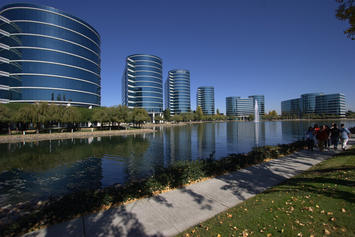
It’s hard to say the word “innovation” and not think of California. Technology has paced the state’s growth in everything from agriculture and oil to housing, entertainment, and aerospace. California has always been the harbinger of the American future, the promise of ever-greater economic and social progress.
Yet increasingly, many of today’s innovators are fleeing the state. This past week, one half of the company arguably most symbolic of tech development in the state—Hewlett Packard Enterprises—one part of the now broken-up old Hewlett Packard and focused on lucrative areas like cloud computing and IT infrastructure—decided to leave for Houston. Within a week Elon Musk, the latest in the line of truly transformative California tech entrepreneurs, also announced that he would move to Texas, along with Oracle, a Fortune 100 company and global leader in database management. Other recent departures also include more traditional firms as Charles Schwab, McKesson, Bechtel, Parsons Engineering, and CB Richard Ellis.
The corporate exodus accompanies a human one. The state’s population, notes demographer Wendell Cox, is now virtually stagnant, with more people leaving and fewer people coming. Millennials, particularly as they ponder family formation (as we recently demonstrated in a report from Heartland Forward), are following a similar pattern. Today, suggests Cox, California, once the ultimate land of youth, is now aging far faster than the rest of nation.
Until the past year, Silicon Valley seemed immune to the economic stagnation or decline afflicting other key state industries such as aerospace, manufacturing, and energy. “We were fat and happy,” notes Jim Wunderman, president and CEO of the Bay Area Council, the region’s leading business group. “Now people are shaking their heads. HPE’s moving sends the message from one of the core founders of Silicon Valley. It’s very troubling.”
The appeal of Silicon Valley, as Wunderman is quick to add, has not disappeared: natural attractiveness and a congenial climate, leading universities, an unmatched pool of technical talent, and the preponderance of leading venture-capital funds. Even as the state suffers the nation’s highest poverty rate, the tech giants have ballooned in value, and new companies, including a set of IPOs, driven by the low cost of money and the pandemic disruption, are creating an enormous tax windfall—this year estimated at $26 billion.
California politicians, notably Governor Gavin Newsom, believe that this pattern is immutable, and that even as companies leave, new ones will take their place. Yet the process is slowing. In recent years, according to figures developed by UCI business school professor Ken Murphy, California has been losing market share among the 11 states with high concentrations of innovation-oriented firms. Since 2005, California’s share of the nation’s innovation business has dropped 3 percentage points, while competitors like Florida, Oregon, Arizona, and Utah have expanded their share. The Bay Area has also seen an exodus of corporate headquarters, often to Texas.
California’s innovation industries, which include science and engineering services, are no longer adding jobs faster than those of several other states, notably Florida, Utah, Arizona, and Washington. California’s innovation economy, to be sure, remains a powerful one, with 27 percent of all innovation businesses nationally, but in a world of corporate mobility, for how long will businesspeople be willing to absorb the higher costs of the Golden State?
California’s business flight has been gaining momentum for years. State housing policies, including climate-related regulation, and extraordinarily high development fees, have made it hard to build on the periphery of the major metros, where most population and job growth takes place. One result has been that the state’s new house-building permits have fallen to barely half that of key competitor states like Texas, Tennessee, Florida, and Arizona. California also accounts for all three of the worst metros for first-time buyers, according to a recent AEI survey, and six of the top ten.
High housing costs affect employees and are one reason why so many firms with many mid-income office workers—McKesson, Toyota, Bechtel, Jacobs, Parsons, Nissan, Bank of America—have departed for places where these workers can afford to buy a house. High energy prices affect both consumers and industrial companies. Regulation against such things as fossil fuels has driven Occidental Petroleum, one of the largest home-grown firms, out of the state, and threatens the future of Southern California Gas and other remaining fossil fuel companies, not to mention the livelihoods of tens of thousands of people in both the Central Valley and Southern California who work in the industry.
Read the rest of this piece at City Journal.
Joel Kotkin is the author of The Coming of Neo-Feudalism: A Warning to the Global Middle Class. He is the Presidential Fellow in Urban Futures at Chapman University and Executive Director for Urban Reform Institute. Learn more at joelkotkin.com and follow him on Twitter @joelkotkin.
Marshall Toplansky is Clinical Assistant Professor of Management Science at the Argyros School of Business and Economics at Chapman University. He was formerly Managing Director of KPMG’s national center of excellence in data and analytics, and he is a co-founder of Wise Window, a pioneer in sentiment analysis and the use of big data for predictive models.
Photo credit: Rayhe via Wikipedia under CC 3.0 License.












